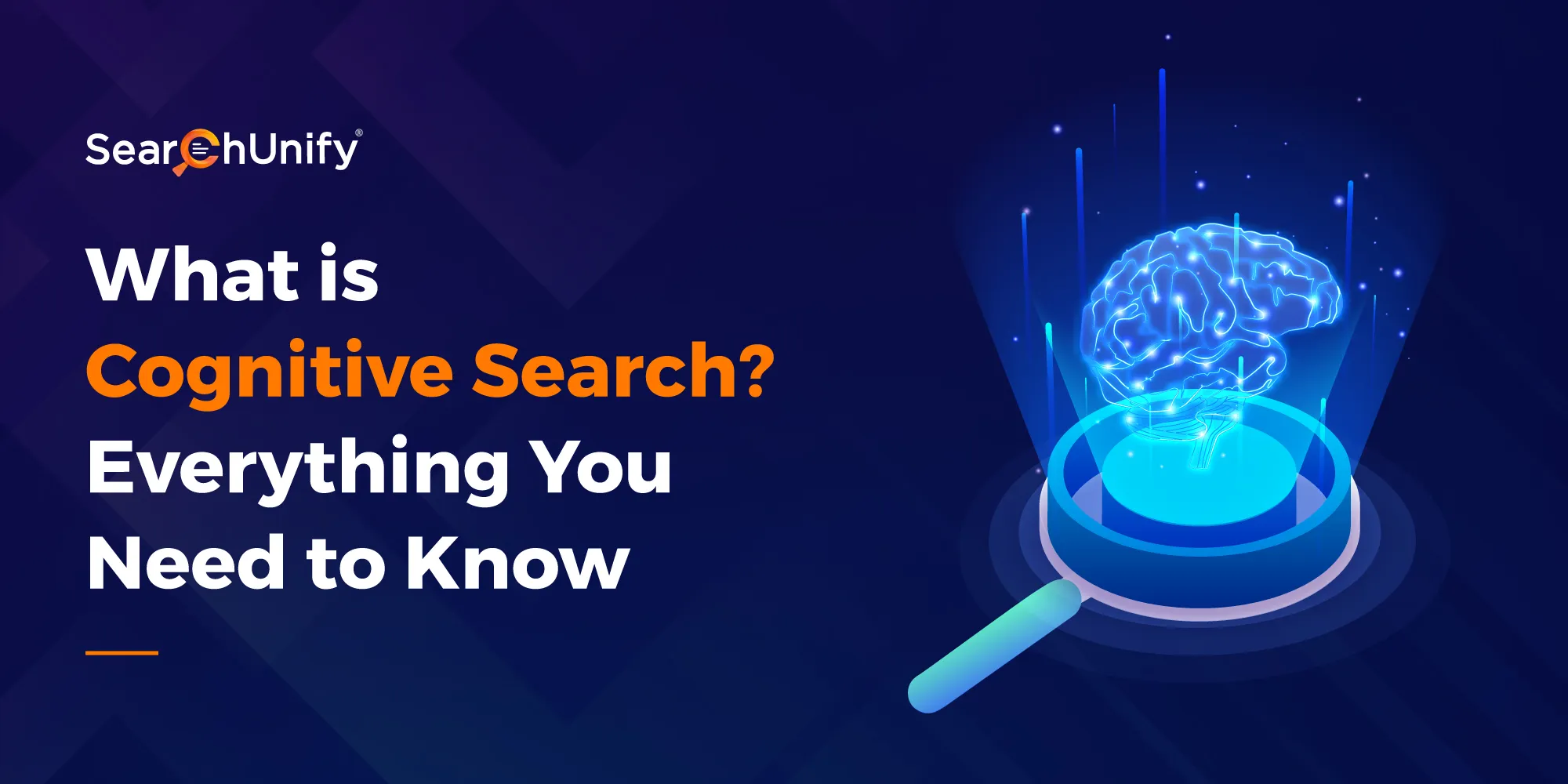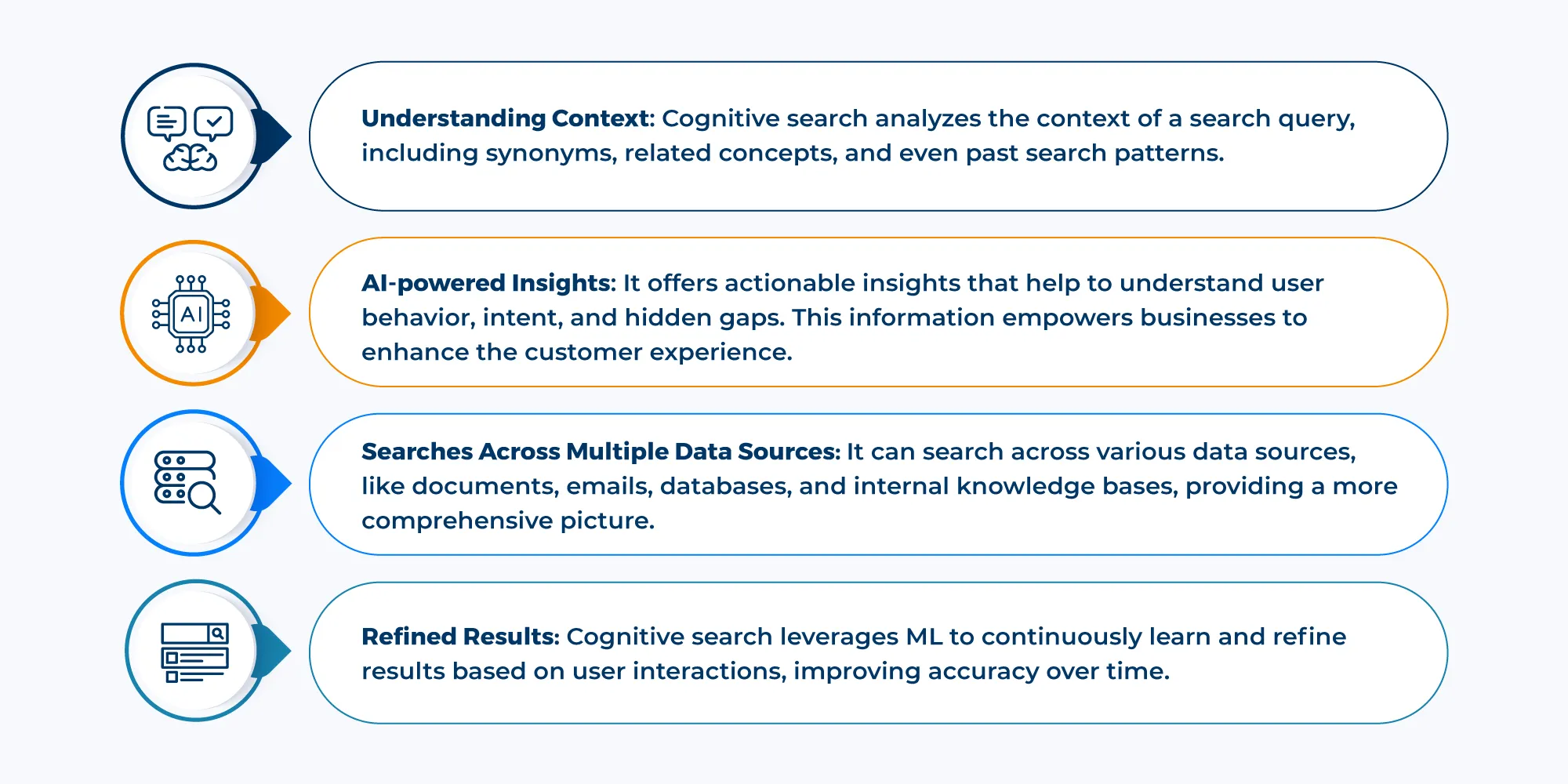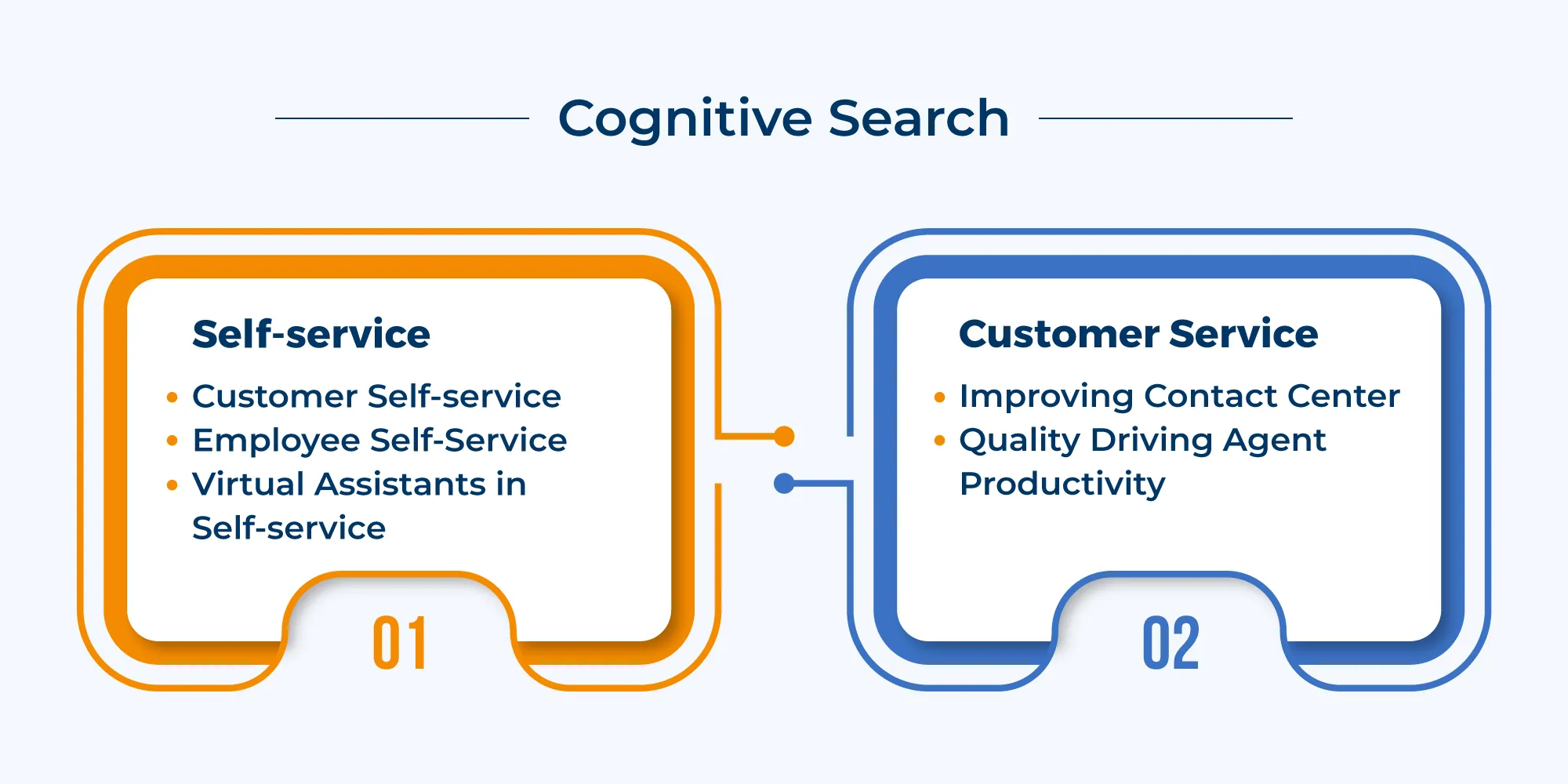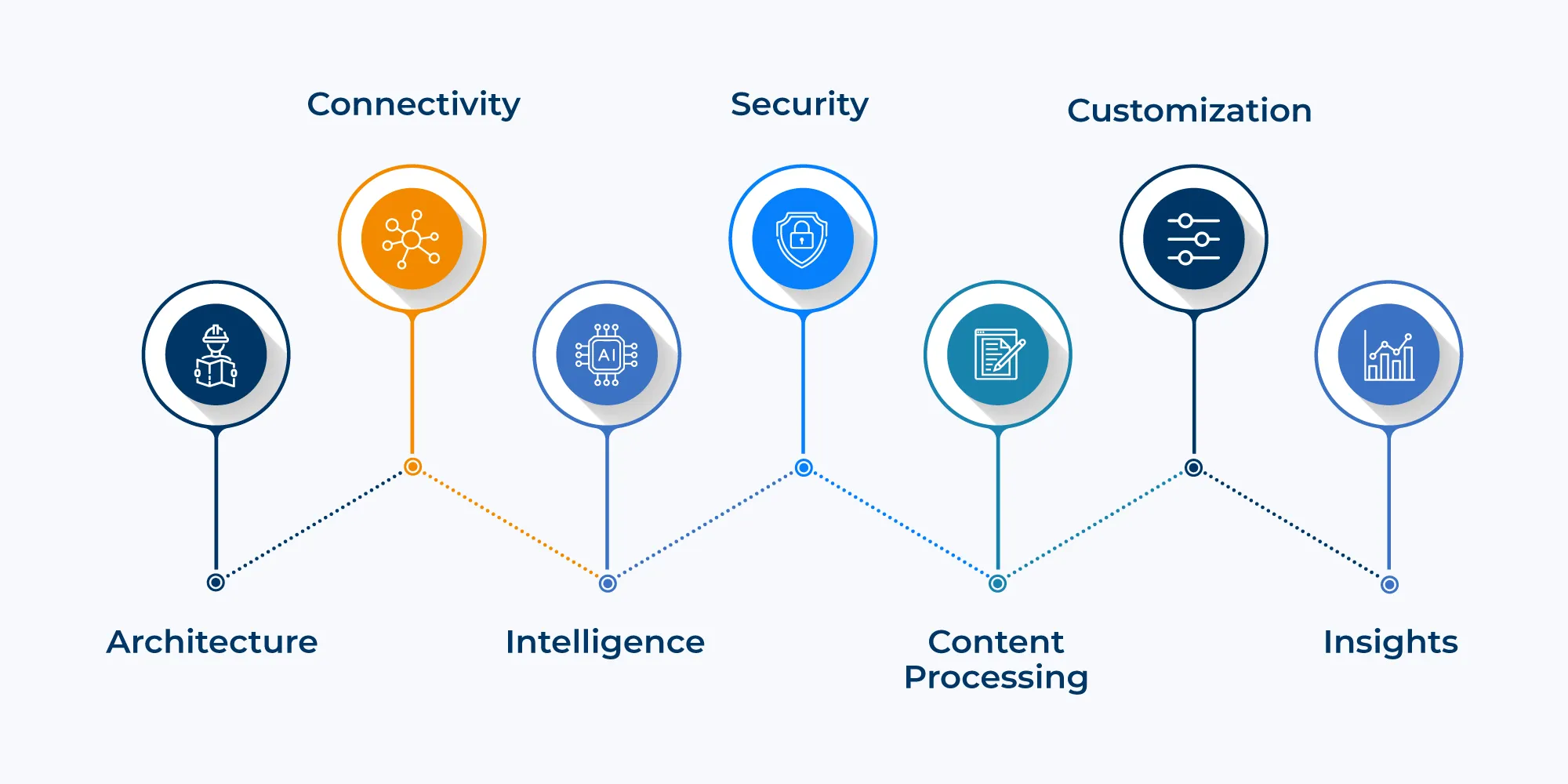
Imagine you’re a support agent sifting through hundreds of cases daily. Searching for a specific customer’s past interactions might be daunting. But what if you find all communication related to a particular order number buried within diverse data sources with a single click? Wondering how? Cognitive search has made this possible.
But before we delve into the need for cognitive search, let’s talk briefly about the predecessor that laid the foundation stone—enterprise search.
Enterprise search would fetch answers from all the added sources, but the engine was predominantly keyword-driven. As a result, the quality of the search results was mediocre at best.
Enterprise search was failing to deliver contextual results and extract actionable insights to elevate the user experience. Hence, the search engine needs to look beyond the keywords to understand what a user is looking for.
Finally, enterprise search got the nudge it needed to go a step further. Search solutions started leveraging AI and its core technologies, like machine learning (ML) and natural language processing (NLP), to decipher search queries and feed users with relevant results. Leading analyst firms have given it the moniker of ‘cognitive search‘ or ‘insights engine’.
1. Cognitive Search: The Next-Gen Enterprise Search
What if your search requires deeper understanding? That’s where cognitive search steps in. Cognitive search is an advanced search technology that leverages AI to understand the meaning and intent behind a user’s query.
It goes beyond simple keyword matching used in traditional enterprise search and aims to deliver insightful and contextually relevant results.
Here’s a breakdown of key features of cognitive search:


2. But, What Makes Cognitive Search Great for Businesses?
So now that you have a good understanding of the basics, let’s talk about how cognitive search can turn out to be a big asset for organizations.

2.1. Self-service
Customer Self-service
Gone are the days when phones were the only way of reaching a support team. In fact, the modern customer prefers to self-serve. HBR stated that 81% of customers prefer to self-solve their issues before reaching out to a support representative.
When customers face an issue, they prefer to find answers online. That’s why it is imperative for businesses to implement self-service solutions. However, there’s a problem. Many people find your self-service channels difficult to use. These solutions also need to live up to customers’ expectations or else they end up being a dejected novelty.
But what do customers expect? They expect a smart search on your self-service channels to be just as capable as Google, if not better. Here is what it needs to offer:
- One operation to search multiple repositories at once. This would eliminate the need to switch to different platforms to look for the same thing.
- Contextually relevant and personalized results at the top. If that’s not the case, many people won’t bother looking beyond the top 3-4 results, let alone the second page. Pretty harsh, right?
- Not having to type the complete query. When a user is typing a query, they often stop after a few keystrokes to check if the suggestions mirror their mind. If it isn’t there, they would be forced to type in the complete query. But the worst thing that can happen is users waiting for suggestions that never populate. What a buzzkill!
That sounds like a lot, doesn’t it? Fortunately, cognitive search bridges the gap between expectations and reality. It consolidates a pool of information that enables customers to search multiple repositories from the point of search.
With machine learning & natural language processing (NLP) powering its core, cognitive search understands queries and correspondingly provides relevant results. And yes, it can gauge queries on the fly. This elevates the customer experience and keeps them happy.
Employee Self-Service
As the name suggests, it allows employees to take care of several job-related tasks that would otherwise need to be completed by other resources or management.
Employee self-service helps enterprises save labor hours and increase efficiency. And when you add cognitive search to the mix, the result is nothing short of exhilarating. Here’s how:
- Onboarding: The first few days can be a tad daunting for new hires. You might have a lot of information on the internal community, employee handbook, intranet, etc. But for new employees, finding it can be a challenge.
Cognitive search provides cross-platform search to your new recruits which improves information discovery and accelerates the onboarding process.
- Upskilling: Surprisingly, many organizations only train their agents at the time of joining. Needless to say, the learning should never end. The insights engine can track and report agent performance so that the managers can zero-in on the areas of improvements, if any.
Accordingly, they can developed training programs to overcome hurdles and help agents upskill like never before.
Virtual Assistants in Self-service
One just can’t talk about self-service without mentioning virtual assistants. For customers, these intelligent assistants can fine-tune conversations for every individual user. Thanks to AI and NLU, they can identify the intent and provide more contextual responses. They can mine search data and previous interactions to deliver engaging & effective answers.
Additionally, they give your support heroes the ability to quickly send out the first response when a case comes in. They quickly analyze previous cases and their subsequent responses to suggest a fitting answer in the form of a comment or an article.
And of course, they handle basic queries and reduce the burden on your agents. This also gives your agents more time to resolve complex issues and hence improve CSAT.
After putting all these efforts into self-service, you might as well want to see the results by measuring self-service success. For that, you’ll need a couple of concrete self-service metrics that you can base your judgment on.
2.2 Customer Service
Customer service is not what it used to be a decade ago. Now, customers expect businesses to help them on a multitude of channels, such as email, social media, website, community, chat, and whatnot. And they do not want to wait at all.
If you fail to be proactive, they won’t waste a breath mourning the inconvenience. They will instantly switch to competitors. So, your contact center and its agents need to be up to snuff. Again, here, cognitive search can help you out. Let’s see how:
Improving Contact Center Quality
The present-day customers seek immediacy & personalization. Unfortunately, many contact centers fail on these fronts. But cognitive search can turn the tables by:
- Combining KBs: Enterprises create knowledge to make the going easy for employees & customers. But it’s often scattered across platforms. One has to tirelessly switch across KBs to find the ideal solution. A cognitive search engine scans multiple repositories and delivers relevant content within the contact center.
- Augmenting Knowledge Creation: KCS is a renowned method for elevating contact centers. It involves agents adding new articles for new ones that they resolve. But they seldom show interest in knowledge creation. Thanks to cognitive search, you can automate the KCS building process. As the agent resolves a new issue, AI analyzes the interaction and auto-populates a help article on a predefined template.
Driving Agent Productivity
The job of a customer service representative is undoubtedly tough. Thankfully, cognitive search engines often bundle with an array of AI-fueled apps that make their job easier and maximize productivity. Some of them include:
- Cross-Channel Search: As mentioned earlier, support executives have to look all over your web properties to help a customer. This not only slows down the process but also infuriates your service agents. A cognitive search engine creates a unified knowledge pool that agents can use to instantly find relevant information across all KBs.
- Agent Assist: Quickly sending out that first response is crucial, irrespective of the service channel. Well, what if you give your agents an agent of their own? Something that leverages machine learning to quickly analyze similar cases related to a new ticket to quickly suggest a fitting response? That will definitely reduce stress on your agents.
- Smart Insights: Cognitive search engines can mine analytical data that offers insight into what agents search frequently, whether they find results or not, which results are getting more engagement, etc. This helps support managers to identify the hurdles and then clear the path for agents.
3. What the Future Has in Store for Cognitive Search
What a long, fascinating journey it has been for the search! Present-day cognitive search engines can index cloud solutions as well as unstructured data and still deliver relevant answers to the user. But this is just the beginning. The future promises even more exciting evolution in this field.
- Voice Search: Why type when you can speak? Alexa, Siri, and Google Assistant have already revolutionized the way we search. Their influence is set to expand further as voice search becomes an integral part of cognitive search.
In fact, ComScore stated that by 2020, 50% of all searches will be carried out by voice.
- Visual search: This is another handy search application that holds immense potential for the future. Your search query will be a picture of the item you’re looking to gain knowledge about. Google Lens is one of the most prominent examples of this.
4. Choosing the Right Cognitive Search Engine
Whether you are contemplating your first cognitive search solution or planning to migrate from a legacy solution, you must pick the right cognitive search engine.
A bad decision can be a costly affair for you and potentially derail knowledge management initiatives over several years. Here are some of the variables that will help you gauge various solutions:

Architecture
The first thing you need to know is the technology the solution is built on. How does it store data? Is it compatible with your tech stack? The answers to these questions will help you understand what it takes to live with the solution.
- Scalability: Scalability is not just a feature, but a necessity for a search solution. The ability to manage billions of documents is a testament to the solution’s robustness. A sophisticated configuration ensures that the solution can handle large volumes of data without compromising on service quality.
- Deployment: Many search vendors delegate implementation to third-party partners. This not only adds to the cost but can also extend the deployment time to months. An ideal cognitive search solution shouldn’t require third-party integrations, and a standard implementation just cannot run into months.
Connectivity
Connectors play a vital role in integrating systems within your digital infrastructure, such as CMS with CRM. The number of native connectors a solution offers out-of-the-box is important, as it determines the ease of integration.
If an official connector isn’t available, the ability to develop one yourself or the provision of an API becomes crucial. These factors will help you gauge how the search solution will fit within your firm’s digital infrastructure.
Intelligence
A search solution without intelligence is like a car without an engine. Here are a few things that you should keep an eye on while choosing an cognitive search solution:
- Relevance: Relevancy ranking refers to sorting results in a way that places the most relevant content at the top. To make it happen, smart search engines leverage machine learning to analyze the user’s profile, search history, and behavior to optimize search results.
- Tuning: While relevant results are automatically delivered, tuning places control in your hands. It allows you to control how results appear for a particular search query. You can promote or demote a particular content type, piece, keyword, etc. or even remove it from the results altogether.
Security
Security is paramount in large enterprises with millions of users and multiple repositories containing varied data types. For the integrity of in-transit data, choose a solution that handles transactions over HTTPS and TLS layers.
Content Processing
Content pulled in from diverse sources might have different or no metatags. This inconsistency has a detrimental effect on the quality of search results.
Content processing prevents that from happening. Generally, a product with automatic tagging makes the going a lot easier and improves the user experience.
Customization
Is there a custom implementation on the cards? If yes, will it be outsourced to a third-party partner? Or better, will the cognitive search vendor provide an API so that you can make small adjustments yourself?
Even if you don’t need it right away, the solution should be customizable for contingencies.
Insights
You can’t manage what you can’t measure. Cognitive search offers real-time search analytics that helps you understand user behavior and content usability more deeply.
It also tracks engagement to segregate relevant content from the rest. This gives you an opportunity to reexamine the reason behind mediocre performance and improve the quality of your content.
About SearchUnify
SearchUnify, by Grazitti, is an AI platform that powers cognitive search, an insights engine, and applications. The cognitive search solution delivers relevant and personalized search results with cross-platform enterprise searchpowered by AI algorithms derived from end-user behavior.







